Two Iran Prison Hunger-Strikers Reported Ailing
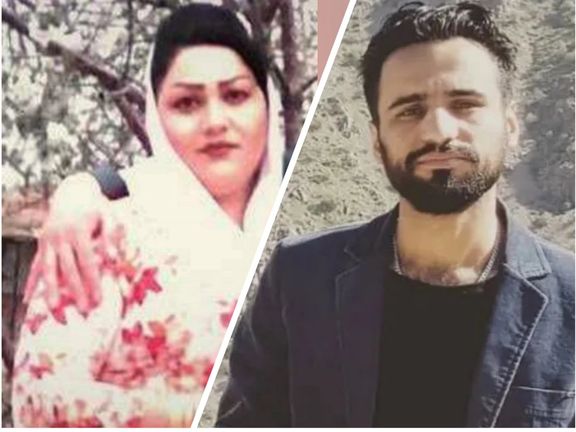
Human rights groups have expressed concern over the health of hunger-striking Iranian prisoners Behnam Mousivand, civil rights activist, and So’ada Khadirzadeh, a pregnant Kurdish woman.

Human rights groups have expressed concern over the health of hunger-striking Iranian prisoners Behnam Mousivand, civil rights activist, and So’ada Khadirzadeh, a pregnant Kurdish woman.
The United States-based Human Rights Activists' News Agency (HRANA) said Wednesday that Mousivand, a political prisoner who has been on hunger strike for at least two weeks, had "lost a lot of weight, has difficulty speaking, and is in pain and nausea." Tens of Twitter users posted hashtags Wednesday evening demanding his freedom.
The Oslo-based Iran Human Rights had earlier said Mousivand started his hunger strike in Rajai Shahr prison, Karaj, April 19 and was transferred to the quarantine ward of Evin prison after about a week.
Amnesty International Tuesday expressed worries over the deteriorating condition of Khadirzadeh, who is eight months pregnant and held in Orumiyeh prison, West Azarbaijan province. Amnesty said that her life at risk due to a denial of specialized medical care, including for heart and kidney problems, although prison doctors last December issued a medical note confirming she required such care outside prison.
Khadirzadeh has been on hunger strike since April 26 to protest her seven-month detention without charge. Following her arrest October 2021 by intelligence officers in Piranshahr, West Azarbaijan province, she said in an audio message from prison that she had been interrogated in an intelligence ministry’s detention center before transfer to the women’s ward of Orumiyeh prison three weeks later.
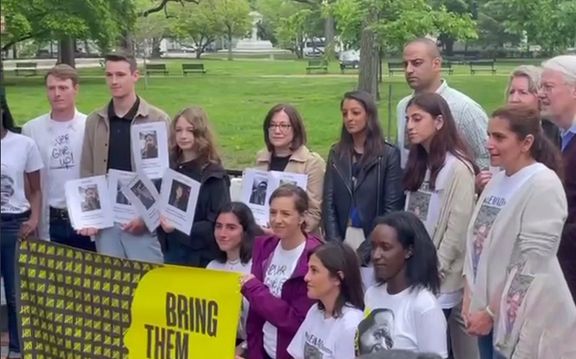
In Lafayette Park, Washington DC, Wednesday, protestors called for President Joe Biden to meet relatives of two American-Iranians jailed in Iran.
The families of Emad Sharghi and Iranian-British-American Morad Tahbaz joined the demonstration at the park, which is across the street from the White House and commonly used for rallies.
Tara Tahbaz, daughter of Morad Tahbaz, told CNN at the rally that the jailed men were “not just another name on a list, they're somebody's father, son, husband." She expressed hope that the United States government was “using every tool that they have on the table to prioritize them.”
State Department Spokesman Ned Price reiterated Wednesday that the jailed Americans – a third is Siamak Namazi, whose father Bagher is also not permitted to leave Iran – were a separate matter to stalled talks between Iran and world powers aimed at reviving the 2015 Iran nuclear deal.
Price told reporters that Washington had told Iran "in no uncertain terms" that the safe release of these Americans was a priority. The US Secretary of State Antony Blinken in April urged Tehran to free Sharghi.
"Iran does have a long history of unjust imprisonment of foreign nationals for use as political leverage,” Price said Wednesday. “It continues to engage in a range of human rights abuses, which include large-scale arbitrary or unlawful detention of individuals, some of whom have faced torture or worse, in some cases execution…”
Iran, which does not allow consular access for dual nationals, holds citizens of several countries including Germany, Austria, and Sweden, as de facto hostages. There have reportedly been Tehran-Washington contacts aimed at a prisoner exchange that would free Iranians jailed in the US, mainly over breaching American sanctions.
Djalali Death Sentence Confirmed
Quoting an unnamed "informed source" Wednesday, Iran's semi-official ISNA news agency, said the Supreme Court had confirmed a death sentence on Swedish-Iranian scientist Ahmadreza Djalali (Jalali) to be carried out within two weeks. Within hours, Nour News, a website affiliated to the secretary of Iran's Supreme National Security Council Ali Shamkhani, also cited unnamed sources in reporting the decision.
ISNA suggested “political pundits” believed Sweden had put on trial a former Iranian judiciary official, Hamid Nouri, for ‘crimes against humanity’ for his alleged role in prison executions in 1988 as a means of pressure on Iran to release Djalali. Iran had confirmed the sentence on Djalali to deter Stockholm from any further such actions, the pundits suggested.
Djalai was convicted in 2016 and given the death penalty on unproven and undocumented espionage for Israel. His wife, Vida Mehrannia, told Iran International November 2020 that her husband was “a victim of Iran's relations with Europe,” fueling speculation that Iran sought by threatening the execution either to secure a prisoner exchange or to influence the trial in Belgium of Iranian diplomat Assadollah Assadi, who was in 2020 sentenced to 20 years for attempted murder.
Expressing concern over Djalai in a tweet Wednesday, Sweden's foreign minister, Ann Linde wrote that Swedish authorities were in contact with Tehran.
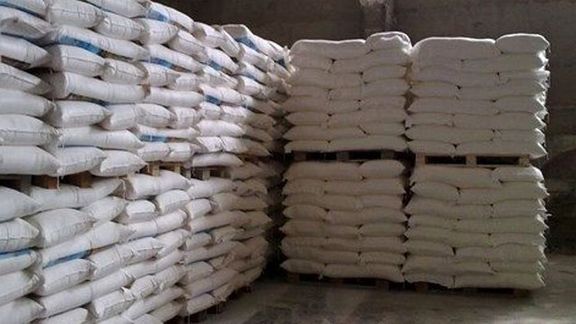
Iran says it has stopped large shipments of flour, sugar and vegetable oil from being smuggled out of the country amid a bread and pasta crisis.
Border Guard Commander Ahmad-Ali Goudarzi said on Thursday that about five tons of flour, four tons of sugar, and 63 tons of vegetable oil have been taken from smugglers at sea and land borders during the past 45 days.
Tasnim news agency also reported on Thursday that 312 tons of flour and 290 tons of vegetable oil were confiscated from businesses hoarding the essential food staple during the past 48 hours.
These statements follow a 2-5-fold government price increases for essential food items such as flour. It is not clear how large quantities of flour or cooking could be diverted from the government-controlled distribution system.
According to the ISNA news agency, pasta, which replaced rice for the lower income classes of society as main source of calories, has also become an unaffordable and expensive product.
The government has been insisting that its oil export revenues have increased and it has secured enough supplies of essential commodities, but prices have soared in recent weeks.
The head of the Flour Producers Association says this year Iran must import 20 million tons of grain – including 6 to 7 million tons of wheat -- noting that the country has never been so dependent on imports.
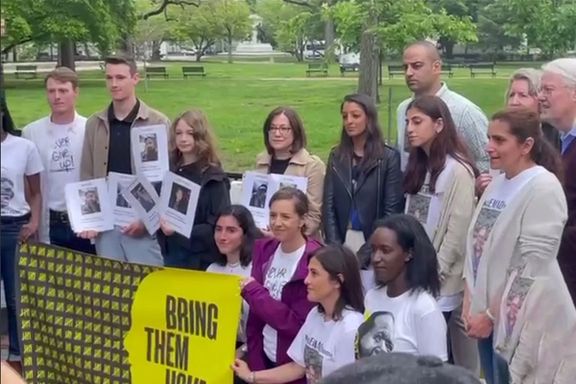
Families of Iranian-American citizens currently jailed in Iran have called on the Biden administration to prioritize their release from the Islamic Republic.
Families of businessman Emad Sharghi, conservationist Morad Taahbaz, Siamak and Bagher Namazi as well as retired captain in Iran’s merchant navy Shahab Dalili -- who is a permanent resident of the US -- gathered in front of the White House on Wednesday.
Late in April, a number of US officials, including Secretary of State Antony Blinken and Special Envoy for Iran Robert Malley, called on Tehran to release Sharghi and stop its policy of holding people as political pawns.
“For four years, the Shargi (Sharghi) family has waited anxiously for the Iranian government to release Emad”, Blinken said.
The 56-year-old businessman has been sentenced to ten years in prison on charges of espionage and collecting military intelligence but had attempted to flee while on bail awaiting the result of an appeal.
Morad Tahbaz, who also hold British citizenship, is also serving a ten-year sentence on espionage charges after arrest with other environmentalists in 2018.
Roxanne Tahbaz, his daughter, held a protest in April at Britain’s foreign office demanding action to free her father.
Foreign governments and human rights organizations have accused Iran of detaining foreigners and dual nationals on trumped up charges to use them for getting concessions from Western countries.
There are allegations that dual nationals are taken prisoner to swap them with Iranian prisoners held abroad, often serving sentences for violating US sanctions or on ‘terrorism’ charges.
In April, families of two German and two Austrian citizens currently jailed in Iran called on the governments in Berlin and Vienna to demand their release as part of nuclear talks with Tehran.
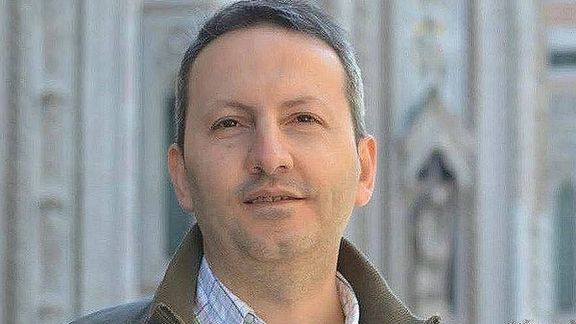
Sweden’s foreign minister has expressed extreme worries over reports about the imminent execution of a Swedish-Iranian scientist jailed in Iran.
In a tweet on Wednesday, Ann Linde reacted to “extremely worrying media reports today that Iran may carry out the death penalty on Ahmadreza Djalali (Jalali)” in the next two weeks.
She said Sweden and the European Union condemn the death penalty and demand that Djalali be released, adding that “We have repeatedly stated this to Iranian representatives. We are in contact with Iran.”
Iran’s semi-official news agency ISNA broke the news earlier in the day, quoting an unnamed official that Djalali was found guilty of “espionage for the Zionist regime” and his death sentence has now been confirmed by the Supreme Court.
Djalali was arrested when he accepted an invitation by a university to visit Iran in 2016. Authorities accused the researcher of espionage – a charge they often use against foreigners and dual nationals that they want to hold as a bargaining chip. Later, Djalali was sentenced to death as Iran tried to ramp up pressure on European countries to free individuals arrested for terrorist activities or on violations of human rights.
The ISNA report also referred to one of these individuals, Hamid Nouri, who was on trial in Sweden until this week, saying that his arrest was meant to put pressure on Iran to release Djalali.
Sweden arrested Nouri, now 61, upon his arrival in Sweden at Stockholm Airport in 2019 and in August 2021put him on trial over the mass execution and torture of political prisoners at Gohardasht Prison in Iran in July and August 1988.

The Russian ambassador to Iran says there is no obstacle in closer Moscow-Tehran cooperation in the field of armaments as a UN arms embargo on Iran was lifted.
In an interview with Russian daily Izvestia on Wednesday, Levan Dzhagaryan (Jagaryan) claimed that Tehran buys weapons from the Russian Federation only for defensive purposes, denying reports that the Islamic Republic is engaged in destabilizing activities in the region.
The statement contradicted numerous reports and accusations by UN experts, the United States and its regional allies that have insisted Iran arms Yemen's Houthi forces and militant groups in the region.
“After the arms embargo against Iran was removed, there are no more obstacles to the development of Russian-Iranian cooperation in this important and very sensitive area”, he said.
Arms trade sanctions imposed by the UN Security Council expired in October 2020, when the United States failed to garner support among permanent members to extend it.
Djagaryan emphasized that “Iran purchases weapons exclusively for defensive purposes, contrary to the assertions of some countries in the region that Iran is allegedly engaged in subversive activities in the region. I refute it.”
He also hailed the military-technical cooperation with Iran, saying, “At one time [in 2016], we supplied the S-300 anti-missile defense systems.”
Rejecting reports about Iran sending weapons -- including anti-aircraft missile launchers -- for the Russian troops to use in the invasion of Ukraine, he said that “the British media, and not only the British media, is a well-known fake news factory... This is not the first time, and I don't think it will be the last”.
Restoring the Joint Comprehensive Plan of Action
He said Russia made every effort to return the deal as it was before the Trump administration “illegally” withdrew from it in May 2018.
“There is a pause in Vienna now, negotiations are not underway yet, because basically the parameters of the upcoming deal have already been agreed, but there are a number of important issues that Iran and the United States need to resolve - these issues are still not easy to resolve”, he said.
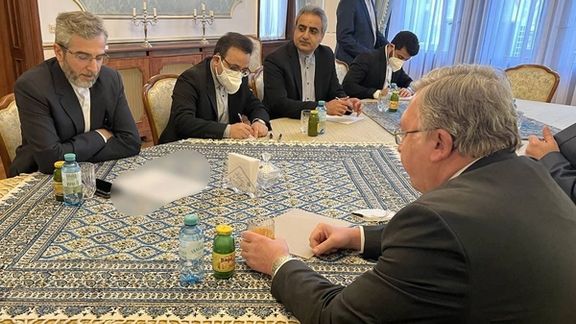
Answering a question about the reports by Israeli media that the US government is close to declaring the nuclear deal talks a failure, he said, “The Israeli media is not the most reliable source of information. I treat them with deep skepticism and distrust. They pass off wishful thinking. Let's wait.”
“No one can give any guarantee that the JCPOA will be reactivated today”, the Russian envoy noted.
He made no mention of Russia’s $10 billion agreements with Iran to build additional nuclear reactors and the US decision to wave Ukraine sanctions allowing Moscow to carry out the projects once a nuclear deal is reached.
North-South Transport Corridor
The Russian envoy stressed the importance of the North-South Transport Corridor, which has long been planned to be opened between Iran and Russia, and said, “There are two main directions here: A land route through Iran, Azerbaijan and Russia, as well as through the Caspian Sea, bypassing transit countries”.
“We are actively working on this, our trade operations with Iran are carried out both by water through the Caspian Sea and through the territory of the Republic of Azerbaijan,” he said, highlighting the recent trip to Moscow by Iranian Road and Urban Development Rustam Ghasemi.
He added that the closure of several European routes for Russia has made the North-South corridor even a higher priority.
“We have a number of very important projects with Iran, they did not start yesterday,” he said, mentioning “a project for the electrification of the Garmsar-Inche Burun railway from the central provinces of Iran to the Iranian-Turkmen border” and “the construction of the thermal power plant (TPP) Sirik, which is expected to run on gas”.
Trade Ties
He also said Iran and Russia can also cooperate in a wide range of sectors, including oil and gas, transport, communications, IT, science and technology, food and agriculture.
Dzhagaryan went on to say that Iran can offer Russia “traditional types of products, such as vegetables, fruits, dried fruits, nuts". Iranian manufacturers also offer petrochemicals, pharmaceuticals, building materials and light industry products as well as clothing and footwear, he added.
Highlighting the quality of Iranian products, considering their prices, the ambassador said, “I am now dressed in a suit of an Iranian manufacturer of Armenian origin, Mr. Hagopian. Very good suits and shirts.”
“As the Russian ambassador to Iran, I will make every effort to ensure that this cooperation develops as massively and quickly as possible for the benefit of our countries”, Dzhagaryan said.